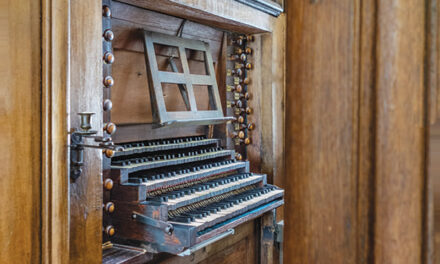Opera Carolina subscribers have never been as fervid about Peter Ilyich Tchaikovsky as their Charlotte Ballet counterparts. On opening night of Opera Carolina’s Eugene Onegin, you could calculate the difference by gazing at the empty seats at Belk Theater. Artistic director James Meena, with a generous deployment of musicians from the Charlotte Symphony Orchestra, gave an admirable account of the score. Scenic designer Peter Dean Beck engineered a setting that evoked the look and feel of the Metropolitan Opera’s Onegin, brimming with wintry birch tree trunks. Still, the new Opera Carolina production wasn’t quite engineered to change subscribers’ minds. In the early going, Alexy Lavrov‘s performance as Onegin paled in comparison with what I experienced from the late Dmitri Hvorostovsky in New York. The baritone’s difficulties were compounded when the projected supertitles, wayward all evening long in tracking the action, failed altogether at the climactic moment when Onegin gave his polite and heartless answer to the passionate declaration of love that young Tatyana had written to him the night before. We lost some valuable nuances there.
Tchaikovsky and Alexander Pushkin, whose verse novel the composer adapted for his 1879 opera, no doubt expected us to like and empathize with the earnest young poet, Vladimir Lensky, more than with the best friend who suddenly became his mortal enemy. With tenor Sebastien Gueze as the pure-hearted poet, I also found Lensky more impressive, not only in his valedictory aria before the fatal duel with Onegin but also at the festive ball scene, where the poet’s jealousy over his friend’s advances to his fiancée Olga ruptures their friendship. After his moving performance of “Lenski’s Air,” I was doubly sorry to see Gueze go.
Yet once the fatal duel had concluded Act II, something almost magical occurred. After the pivotal gunshot and confirmation of Lensky’s death, Onegin hung around, without the curtain going down, as the scene changed from the countryside to six years later at Prince Gremin’s St. Petersburg palace. Meena and the orchestra kept pouring forth the forlorn music of the bosky, pre-dawn duel scene, Lavrov was solemnly helped into a dinner jacket, and just as the opening Polonaise for Act III cued the entrance of the noble guests to the ballroom, the baritone exited to the wings. He returned in a fresh garish white-streaked wig, reminding me somehow of the mature Beethoven, and was magnificent from that moment onwards. The wig change had to happen quickly enough so Onegin could take in the arrival of Gremin and Tatyana – transformed from a forgotten reject into a poised, polished, and radiant princess. For me, it was Lavrov who was the more radically transformed. During this humbling soiree scene, he was the person I empathized with. He was the singer I couldn’t peel my eyes away from.
In her youthful scenes, soprano Melinda Whittington as Tatyana didn’t decisively outshine mezzo Leyla Martinucci as her younger sister Olga. Both roles offer a nice range of emotions and feelings. Initially quiet and bookish, Tatyana breaks into bloom upon encountering Onegin, giddily pouring out her love into her letter and impetuously dispatching it to him against her better judgment. In broad daylight, she endures the double agony of realizing the mistake of her impulsiveness and then having it underscored by Onegin’s dignified rebuff. Olga is the cheerful and playful sister, secure in Lensky’s adoration, just a little too prone to teasing Tatyana and goading Lensky’s jealousy until it’s too late. In a matter of seconds, complacency is swallowed by catastrophe. Martinucci brilliantly bridged her flashes of blithe jollity and the sudden onset of shock and disbelief. To a large extent, the impact of the breach between Lensky and Onegin depended on Martinucci’s devastated reaction.
Whittington was more convincing for me in her quiet formal episodes with Onegin than in Tatyana’s great letter scene, singing it well enough but never living it with that intense mixture of terror and exhilaration that can happen only when you’re in free-fall, carried into the void by an overwhelming tide of love. She seemed to be following director Tom Diamond‘s instructions station-to-station as she restlessly moved around Tatiana’s bedroom rather than infusing these movements with urgency and spontaneity. My confidence in Whittington’s dramatic capabilities remained shaken until the ultimate denouement, although she was majestic enough with her prince at the palace. When Onegin came begging for love and forgiveness, Whittington was fabulously conflicted, seemingly pleading for release and infuriated by Onegin’s temerity at the same time. As before, there was no restraint in Diamond’s direction, but Lavrov’s complete self-abasement and Whittington’s spasms of rage set the scene ablaze.
Of course, it was up to bass baritone Jordan Bisch in his cameo as the aging Prince Gremin to justify Tatyana’s devotion and make Onegin’s presumption play like treachery. With a garrulous, avuncular stage presence, wig and makeup designer Martha Ruskai‘s best work, and one beautiful, heartfelt aria, Bisch did exactly that. It isn’t quite as easy to analyze why Triquet’s gaucherie works so well at the ball before fireworks erupt between Onegin and Lenski, but tenor Johnathan White‘s foppery – and AT Jones‘ costume design – set exactly the right tone. While I couldn’t explain why subscribers were shunning Tchaikovsky, I could predict an enjoyable Eugene Onegin experience if they gave it a chance, especially if Opera Carolina’s two stars can reach peak form before Act III.
This opera repeats Saturday, May 11th, and Sunday, May 12th. See our sidebar for details.












